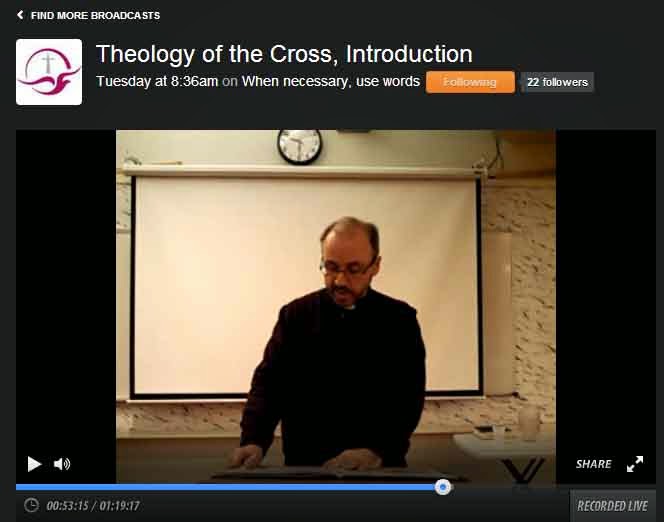Theology of the Cross Q & A
If you have not already done so, please view the full video and or read the text from the March 11 talk."Blood on our Hands"
A: Paul, then known as Saul, was a zealous pharisee determined to blot out from existence the very idea of Christianity, at the time of the stoning of Stephen (see Acts 7:54-60). Paul was present and approved of Stephen's death by stoning. Later, on the road to Damascus, Paul hears a voice say to him, "Saul, Saul, why are you persecuting me? (Acts 9:4)" and later gradually realizes that in killing Stephen, he was also responsible for the crucifixion of Christ.
This idea of empathetically siding with the victim, in this case the stoning of Stephen, is a profound concept for first century AD and indeed for much of ancient human history. Evil was bounded by laws to limit its spread in regulations, such as "an eye for an eye," with only moderate effect. Domination by brute force was the norm. In ancient Rome, there were whole classes of people who had no rights, no dignity, and were considered less than human. Epidemics, plagues, natural disasters, and economic calamities fueled the desire for a scapegoat victim. A victim who was believed to be the cause of the evil. The victim's identity inevitably was blotted out and forgotten and the spotlight shone on the majority as heroes, (instead of killers) who were seen as saviors, freeing the people from the evil that had fallen upon them.
As the Old Testament unfolds, we see a gradually unveiling of the victim, so that in the prophet Isaiah, in the suffering servant passages, (Isaiah 53), we see the foreshadowing of Jesus Christ as victim, "He was spurned and avoided by men, a man of suffering, knowing pain, Like one from whom you turn your face, spurned, and we held him in no esteem (Is. 53:3). As the Isaiah 53 passage continues, "If he gives his life as an offering for sin...I will give him his portion among the great and he shall divide the spoils with the mighty (Is. 53:10-12)," we see the foreshadowing of the victim vindicated, no longer forgotten, but victorious. In the death of Jesus on the cross, the spotlight now shines on the victim, and in the resurrection of Jesus, the innocent victim is now vindicated and restored victorious. The spotlight also reveals the majority, as those with blood on their hands, and no longer as saviors or heroes. With the revelation of Jesus Christ Crucified, the momentum for scapegoating the victim, the false good of attributing evil to the innocent victim has ended, for the light of Christ illumines the truth of the innocent and the guilty.
Of course, the spotlight then shines back on us as guilty ourselves and yet in the same moment our guilt is removed by the sacrifice of Christ on the cross. This Lent, join us as we continue to look towards the cross and its meaning for our salvation.
Join the discussion here with your own questions or reflections:
(Sign up using your email and the access code SF2150 then click on the folder hw1 for week one when you enter the site)
Q. 1 If we view the stoning of Stephen in light of the Gospel of Luke (Acts 7:58, Luke 23:46), we see that very similar words are spoken. Did Paul recognize, by way of his hand in Stephen's death, how he may also be a part of Christ's death?
Q. 2 Not many of us have a conversion experience as dramatic as Paul's event. Where in your own lives do you find God's surprises? Where is that "irresistible presence of the Risen One whom subsequently you will never be able to doubt?"

We look forward to your thoughts and questions!
ReplyDelete